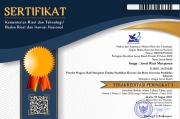ANTESEDEN RECOVERY SATISFACTION AND WOM POSITIF
Abstract
Keywords
References
Andreassen, T. W. (2000). Antecedents to satisfaction with service recovery. European Journal of Marketing.
Aurier, P., & Siadou‐Martin, B. (2007). Perceived justice and consumption experience evaluations: A qualitative and experimental investigation. International Journal of Service Industry Management.
Azemi, Yllka, Wilson Ozuem, Kerry E. Howell, and Geoff Lancaster. "An exploration into the practice of online service failure and recovery strategies in the Balkans." Journal of Business Research 94 (2019): 420-431.
Brown, T. J., Barry, T. E., Dacin, P. A., & Gunst, R. F. (2005). Spreading the word: Investigating antecedents of consumers’ positive word-of-mouth intentions and behaviors in a retailing context. Journal of the academy of marketing science, 33(2), 123-138.
Chebat, J. C., & Slusarczyk, W. (2005). How emotions mediate the effects of perceived justice on loyalty in service recovery situations: an empirical study. Journal of business research, 58(5), 664-673.
Creswell, J. W. (2002). Educational research: Planning, conducting, and evaluating quantitative (p. 676). Upper Saddle River, NJ: Prentice Hall.
Crisafulli, B., & Singh, J. (2016). Service guarantee as a recovery strategy: The impact of guarantee terms on perceived justice and firm motives. Journal of Service Management.
Dabholkar, P. A., & Spaid, B. I. (2012). Service failure and recovery in using technology-based self-service: effects on user attributions and satisfaction. The Service Industries Journal, 32(9), 1415-1432.
Ellyawati, J., Dharmmesta, B. S., Purwanto, B. M., & Herk, H. V. (2013). Perceived justice in service recovery: study of experimental design on Indonesian customers. International Journal of Business and Management Studies, 2(2), 511-522.
Fang, Y. H., Chiu, C. M., & Wang, E. T. (2011). Understanding customers' satisfaction and repurchase intentions: An integration of IS success model, trust, and justice. Internet research.
Fu, J. R., Ju, P. H., & Hsu, C. W. (2015). Understanding why consumers engage in electronic word-of-mouth communication: Perspectives from theory of planned behavior and justice theory. Electronic Commerce Research and Applications, 14(6), 616-630.
Ghalandari, K. (2013). Perceived Justice’s Influence on Post-Purchase Intention s and Post-Recovery Satisfaction in Online Purchasing: the Moderating Role o f Firm Reputation in Iran. Research Journal of Applied Sciences, Engineering and Technology, 5(3), 1022-1031.
Giese, J. L., & Cote, J. A. (2000). Defining consumer satisfaction. Academy of marketing science review, 1(1), 1-22.
Griinroos, C. (1990). Relationship approach to the marketing function in service contexts: The marketing and organization behaviour interface. Journal of business Research, 20(1), 3-11.
Hegner-Kakar, A. K., Richter, N. F., & Ringle, C. M. (2018). The customer loyalty cascade and its impact on profitability in financial services. In Partial least squares structural equation modeling (pp. 53-75). Springer, Cham.
Holloway, B. B., Wang, S., & Parish, J. T. (2005). The role of cumulative online purchasing experience in service recovery management. Journal of Interactive Marketing, 19(3), 54-66.
Jogiyanto, H. M. (2007). Sistem informasi keperilakuan. Yogyakarta: Andi Offset.
Karatepe, O. M. (2006). Customer complaints and organizational responses: the effects of complainants’ perceptions of justice on satisfaction and loyalty. International Journal of Hospitality
Management, 25(1), 69-90.
Karjaluoto, H., Munnukka, J., & Kiuru, K. (2016). Brand love and positive word of mouth: the moderating effects of experience and price. Journal of Product & Brand Management.
Kim, K. A. W. O. N., & Baker, M. A. (2017). The influence of other customers in service failure and recovery. Service failures and recovery in tourism and hospitality: A practical manual, 122-134.
Kim, T. T., Kim, W. G., & Kim, H. B. (2009). The effects of perceived justice on recovery satisfaction, trust, word-of-mouth, and revisit intention in upscale hotels. Tourism management, 30(1), 51-62.
Kim, W., Ok, C., & Canter, D. D. (2012). Moderating role of a priori customer–firm relationship in service recovery situations. The Service Industries Journal, 32(1), 59-82.
Kuo, Y. F., & Wu, C. M. (2012). Satisfaction and post-purchase intentions with service recovery of online shopping websites: Perspectives on perceived justice and emotions. International Journal of Information Management, 32(2), 127-138.
Machin, D., & Campbell, M. J. (1987). Statistical tables for the design of clinical trials.
Martinez‐Tur, V., Peiró, J. M., Ramos, J., & Moliner, C. (2006). Justice perceptions as predictors of customer satisfaction: the impact of distributive, procedural, and interactional justice 1. Journal of Applied Social Psychology, 36(1), 100-119.
Mattila, A. S., & Patterson, P. G. (2004). Service recovery and fairness perceptions in collectivist and individualist contexts. Journal of service research, 6(4), 336-346.
Maxham III, J. G., & Netemeyer, R. G. (2002). Modeling customer perceptions of complaint handling over time: the effects of perceived justice on satisfaction and intent. Journal of retailing, 78(4), 239-252.
Ortiz, J., Chiu, T. S., Wen-Hai, C., & Hsu, C. W. (2017). Perceived
justice, emotions, and behavioral intentions in the Taiwanese food and beverage industry. International Journal of Conflict Management.
Pradiani, T. (2017). Pengaruh sistem pemasaran digital marketing terhadap peningkatan volume penjualan hasil industri rumahan. Jurnal Ilmiah Bisnis Dan Ekonomi Asia, 11(2), 46-53.
Sekaran, U., & Bougie, R. (2016). Research methods for business: A skill building approach. John Wiley & Sons.
Sindhav, B., Holland, J., Rodie, A. R., Adidam, P. T., & Pol, L. G. (2006). The impact of perceived fairness on satisfaction: are airport security measures fair? Does it matter?. Journal of Marketing Theory and Practice, 14(4), 323-335.
Siu, N. Y. M., Zhang, T. J. F., & Yau, C. Y. J. (2013). The roles of justice and customer satisfaction in customer retention: A lesson from service recovery. Journal of business ethics, 114(4), 675-686.
Smith, A. K., Bolton, R. N., & Wagner, J. (1999). A model of customer satisfaction with service encounters involving failure and recovery. Journal of marketing research, 36(3), 356-372.
Solimun, P. C. R. P. P. (2012). Struktural Generalized Structured Componeny Analysis GSCA. Program Studi Statistika FMIPA Universitas Brawijaya. Malang.
Tax, S. S., Brown, S. W., & Chandrashekaran, M. (1998). Customer evaluations of service complaint experiences: implications for relationship marketing. Journal of marketing, 62(2), 60-76.
Tyler, T. R., & Lind, E. A. (2002). Procedural justice. In Handbook of justice research in law (pp. 65-92). Springer, Boston, MA.
Wu, L. (2013). The antecedents of customer satisfaction and its link to complaint intentions in online shopping: An integration of justice, technology, and trust. International Journal of Information Management, 33(1), 166-176.
Xu, X., Liu, W., & Gursoy, D. (2019). The impacts of service failure and recovery efforts on airline customers’ emotions and satisfaction. Journal of Travel Research, 58(6), 1034-1051.
http://ylki.or.id/2018/12/catatan-perlindungan-konsumen-2018-edisi-1-ekonomi-digital-dan-marginalisasi-hak-konsumen/
DOI: https://doi.org/10.17509/image.v10i2.36936
Refbacks
- There are currently no refbacks.
Copyright (c) 2021 Premi Wahyu Widyaningrum, Hadi Sumarsono, Naning Kristiyana
Image : Jurnal Riset Manajemen is licensed under a Creative Commons Attribution-ShareAlike 4.0 International License
View My Stats



